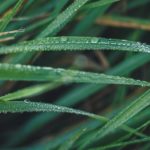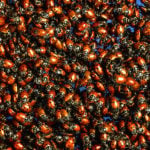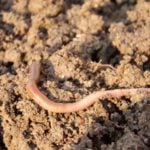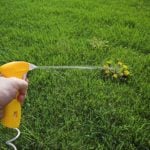
When it comes to weed control, Roundup is a household name. The main ingredient in Roundup, glyphosate, is among the most popular — and most effective — herbicides on the market. It also has become one of the most controversial. Let’s look at glyphosate and the pros, cons, and alternatives to its use.
Glyphosate’s Uneasy History
Glyphosate was synthesized by a Swiss company in 1950. In the early 1970s, Monsanto (later acquired by Bayer AG) patented glyphosate as a weed killer, and Roundup came to market in 1974. It eliminates most annual and perennial weeds.
Questions Emerge
Roundup’s effectiveness made it popular with farmers, and its popularity spread into the landscaping and residential markets. But questions began to arise about the safety of glyphosate, and whether it could be a cancer-causing agent, particularly for Non-Hodgkin’s Lymphoma.
- In 2015, the International Agency for Research on Cancer classified glyphosate as “probably carcinogenic to humans.”
- In 2019, a University of Washington study said that exposure to glyphosate increased the risk of some cancers, including non-Hodgkin’s Lymphoma, by more than 40 percent.
However, in 2017, the Environmental Protection Agency determined that glyphosate is not likely to be a carcinogen. In 2020, the U.S. Environmental Protection Agency (EPA) conducted another review and again said the chemical is unlikely to be a human carcinogen.
Court Challenges
Monsanto and Bayer AG have faced multiple lawsuits from people who allege their cancers were caused by exposure to Roundup. In March 2019, a jury awarded $80 million to a California man who contended that Roundup use was a factor in his cancer. Bayer AG estimates that it has more than 30,000 unsettled claims against the product.
Bayer AG to Reformulate Roundup
In 2021, Bayer AG announced that it would stop using glyphosate weed killer in products manufactured for the U.S. residential lawn and garden market. The reformulated product will arrive as soon as January 2023. The glyphosate herbicide formulation will continue to be sold for agricultural use.
Although glyphosate will be phased out of Roundup, it is still available in other weed killers for land and aquatic use. The National Pesticide Information Center says that more than 750 products containing glyphosate are sold in the United States.
Pros and Cons of Using Glyphosate
Pros of Using Glyphosate
It works: One shot is enough to make weeds wither. According to a memorandum on EPA.gov, glyphosate-based herbicides save time and money since farmers don’t have to use multiple weed-control products in a field. It also allows for reduced tillage or no-till farming, it says, which preserves soil moisture and prevents erosion.
It increases farm yields: For large-scale growers, glyphosate increases the size of harvests each growing season. It acts as a broad-spectrum, postemergence herbicide, killing off weeds that would compete with crop plants for water and nutrients.
It gives quick results: Glyphosate products work fast. You may see some effects in a few hours, depending on the product and weed type, according to Roundup’s maker. However, it usually takes a week or so for it to get to the weed’s roots.
Cons of Using Glyphosate
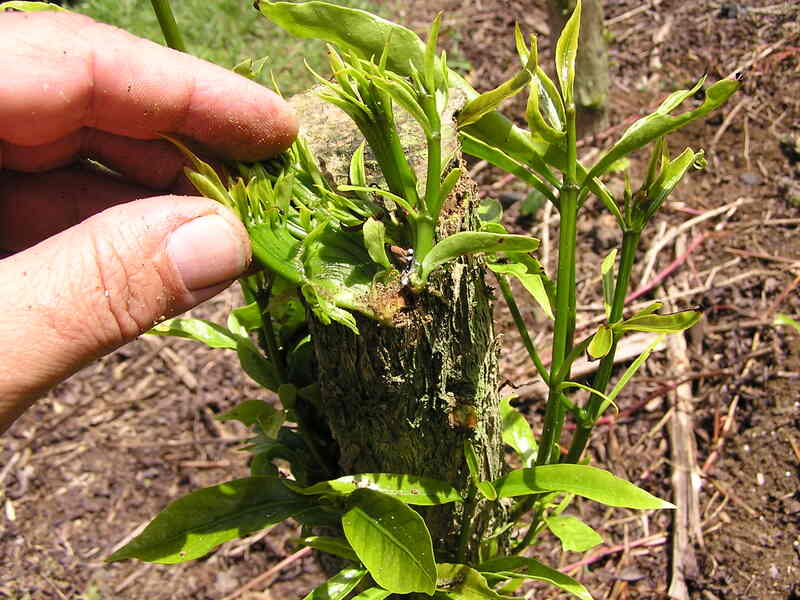
Photo Credit: Scot Nelson / Flickr / CC0 1.0
It might work too well: Roundup is considered a “nonselective” herbicide, which means it kills any foliage that it contacts. If overspray hits your garden flowers, they’ll die, too. The Penn State Extension suggests protecting young trees from the spray. Glyphosate can be absorbed by the bark and eventually get into the tree’s root system, where it can cause multiple injuries.
It could harm the environment: Glyphosate binds to the soil and is considered to have limited potential for runoff into surface waters and is rarely reported in groundwater. However, a study published in 2018 said that even at low doses, the herbicide stimulates the growth of toxic algae and could affect both wildlife and livestock.
Glyphosate in foods has caused concern: Trace amounts of glyphosate residues are found in many of the foods we eat, including fruits, vegetables, and cereals. The EPA says that these trace amounts are not of concern to consumers. However, various advocacy groups have published reports citing analyses that show high levels of glyphosate in various foods.
Does Glyphosate Have Long-Term Health Risks?
It’s the billion dollar question: Is glyphosate safe? Several studies have looked at possible long-term health risks related to glyphosate, including whether glyphosate may cause cancer.
A 2013 article in Interdisciplinary Toxicology cites possible links to celiac disease and other gut issues. A 2017 review in the Journal of Epidemiology and Community Health highlights possible links to cancer, kidney disease, and impaired reproductive development.
However, other articles, such as one published in Regulatory Toxicology and Pharmacology, echo the EPA’s stand that glyphosate does not pose a human health risk.
Glyphosate Alternatives
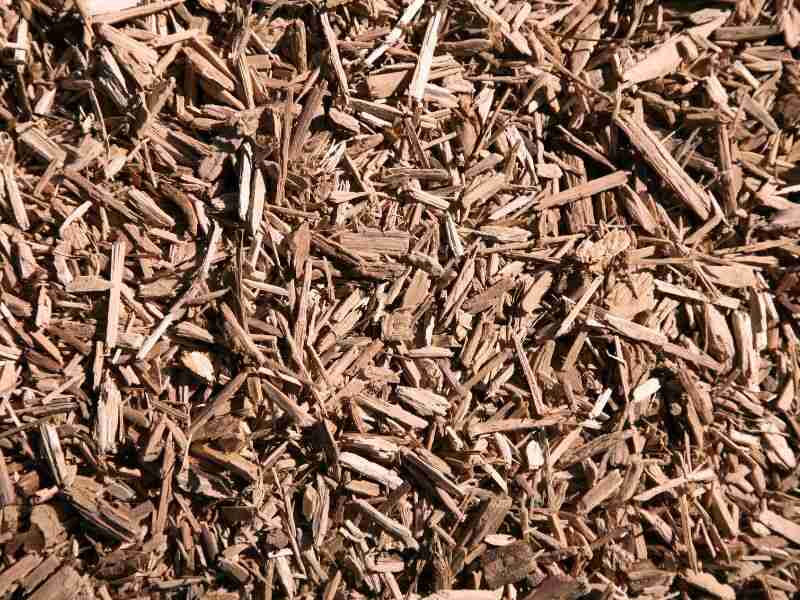
Photo Credit: SDI Productions / Canva Pro / License
You don’t need a degree in weed science to start to reduce the weed population in your lawn. Alternative weed-control methods that you can try are:
Pull out the weeds by hand. This method, also called mechanical weed removal, works best if the weeds are young or have a shallow root system. Otherwise, any bit of root left behind will grow again.
Try a DIY weed killer. Some experts claim it’s not especially effective, but a vinegar solution spray remains a popular choice. Or try boiling water, which is effective on weeds that pop up in your patio and driveway.
Use pre-emergent weed killers. There are commercial pre-emergents available that keep annual weeds from germinating. Other options:
- Mulch
- Landscape fabric
- Newspapers, cardboard, and other landscaping fabric alternatives
- Corn gluten meal
Use organic herbicides. There are many effective organic herbicides available. Ingredients in these products include:
- Herbicidal soaps
- Citric acid
- Essential oils
- Chelated Iron
- Horticultural vinegar (acetic acid)
Use an Integrated Pest Management (IPM) approach. IPM focuses on non-chemical methods to maintain a healthy lawn and garden. Chemicals are used only as a last resort. Hand-pulling, overseeding to keep grass thick each year, and mowing at the proper height for your grass type are all ways to maintain a (nearly) weed-free lawn without chemicals.
Use a flame weeder. This works best on young weeds, or weeds on a solid surface, like a sidewalk. The idea is to deliver a short burst of heat, not set the weeds on fire. But use caution. Don’t use a flame weeder on or near flammable surfaces. And don’t use it on a windy day.
If you wish to avoid using glyphosate products, there are ways to control the annual broadleaf weeds that pop up on your lawn. Weeds that can be well-controlled with alternate methods include:
- Chickweed
- Dandelion
- Spurge
- Yellow woodsorrel
- White Clover
Glyphosate Safety Tips
If you use a weed killer that contains glyphosate, take the same steps to protect yourself that you’d follow with any herbicide use.
- Wear long sleeves, long pants, and gloves.
- Wear goggles to protect your eyes.
- Avoid all direct exposure between the chemical and your skin.
- Don’t spray when it’s raining or windy.
- Be careful where you spray. Non-selective herbicides like glyphosate will kill any plant it comes into contact with.
- Keep people and pets off the treated areas until the spray has dried.
Most importantly: Before you use any garden chemical to spray for weeds, read the label before you begin. Then be sure to follow the manufacturer’s directions for use.
FAQ
Other ingredients in the glyphosate herbicide mixture might make glyphosate more toxic. If you are exposed, symptoms include:
● Eye or skin irritation
● Nose or throat irritation
If you ingest glyphosate (most commonly by not washing your hands before eating or smoking) the symptoms are:
● Burns in the mouth and throat
● Nausea
● Vomiting
● Diarrhea
Generally, glyphosate is considered to be safe for pets once the sprayed area is dry. According to the National Pesticide Information Center, exposure to the herbicide can produce these symptoms in pets:
● Drooling
● Vomiting
● Diarrhea
● Loss of appetite
● Lethargy
● In cats, exposure can create severe respiratory issues that can be fatal.
To be safe and avoid glyphosate toxicity concerns, keep your pets away from areas still wet from herbicides or pesticides. Keep all lawn and garden chemicals and other pet dangers out of reach.
No. Some versions use penoxsulam, which was introduced in 2004 and originally developed to use on rice crops. An EPA fact sheet says it is safe for humans.
However, a 2012 Wisconsin Department of Natural Resources fact sheet says it’s classified as “Suggestive Evidence of Carcinogenic Potential,” due to evidence that it caused tumors in a rodent study. But there is no evidence to link it to human cancer risk.
When to Call a Professional
The type of weed killer that you use on your lawn and garden is ultimately your decision. But finding the right herbicide for your needs can be a tough choice. Why not call a lawn-care professional? A local pro can take your preferences into account and recommend the best weed management approach for your property.
Main Image Credit: Mihajlo Maricic / Canva Pro / License
